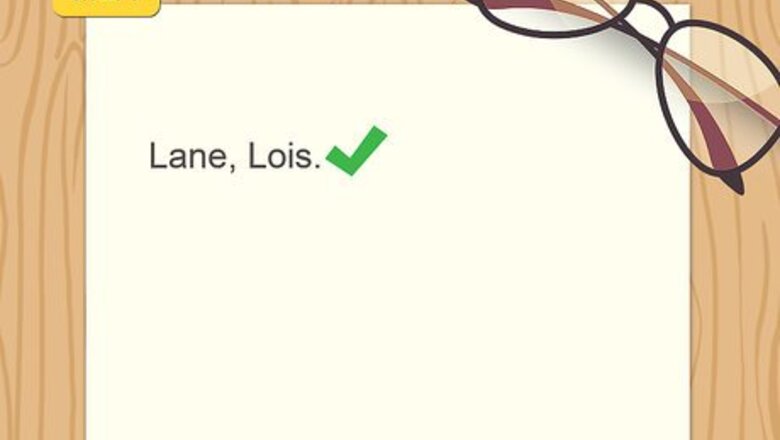
views
MLA
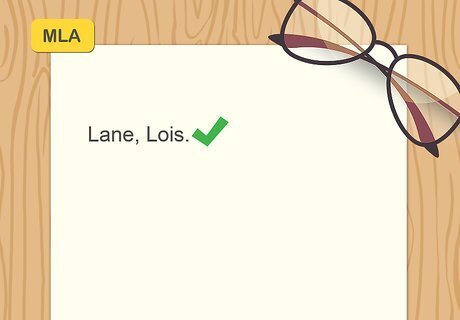
Start your "Works Cited" entry with the author's last name. As with any other book, write the author's last name first, then a comma, then their first name and middle initial (if available). Close this section of your citation with a period. Example: Lane, Lois.

Include the title of the book in italics. After the period following the author's name, copy the title of the book using title case. In MLA style, you typically capitalize all nouns, pronouns, adjectives, verbs, and adverbs. Place a period at the end of the title. Example: Lane, Lois. Serially Saved by Superman: My Work with Clark Kent.

Identify the publisher and year of publication. Your "Works Cited" entry typically closes with publication information for the book. After the name of the publisher, type a comma. Then provide the year the book was published. End your citation with a period. Example: Lane, Lois. Serially Saved by Superman: My Work with Clark Kent. DC Press, 2017.

Include page numbers if you are only referencing the appendix. If the appendix of the book is the only thing you're using, close your "Works Cited" entry with the page numbers on which the appendix appears. This is similar to how you would cite a specific chapter or essay in an edited book. Use a comma instead of a period after the year of publication. Before the page numbers, use the abbreviation "p." for a single page, or "pp." for multiple pages. Example: Lane, Lois. Serially Saved by Superman: My Work with Clark Kent. DC Press, 2017, pp. 512-514.
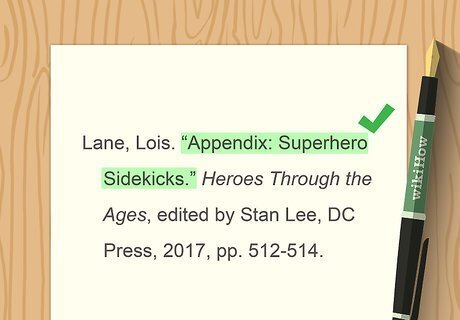
Treat the appendix as a separate work if it has a separate author. Rarely, an author will write the appendix to a book or collection written or edited by someone else. When this is the case, write your "Works Cited" entry as though they are the author of a piece of the larger work. Example: Lane, Lois. "Appendix: Superhero Sidekicks." Heroes Through the Ages, edited by Stan Lee, DC Press, 2017, pp. 512-514.

Use the word "appendix" in your parenthetical citation. Normally you would include the author's last name and the page number in the parenthetical citation in the body of your paper. If you're citing an appendix, the page number isn't necessary. Example: (Lane, appendix) Some books have multiple appendixes. In that case, specify which appendix you're referencing with the same label used in the book (typically a capital letter). For example: (Lane, appendix A).
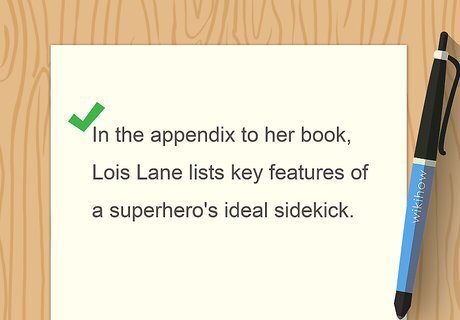
Mention in the text that you're looking at the appendix. Within the body of your paper, you can let your readers know that the material you're referring to is in the appendix of the main work, rather than in the body of the work itself. Example: In the appendix to her book, Lois Lane lists key features of a superhero's ideal sidekick.
APA
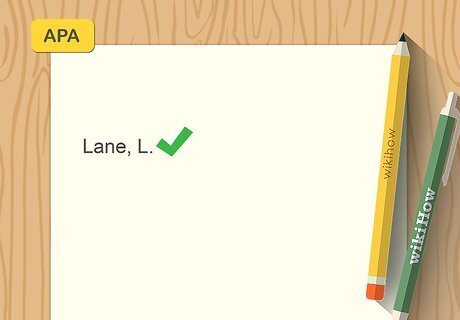
Start with the author's last name and initials. If the work as a whole is a book, your full citation in your references list should provide the author's last name first, followed by a comma. Use the first initial and middle initial, if given. End this section of your citation with a period (normally the period after an initial). Example: Lane, L.
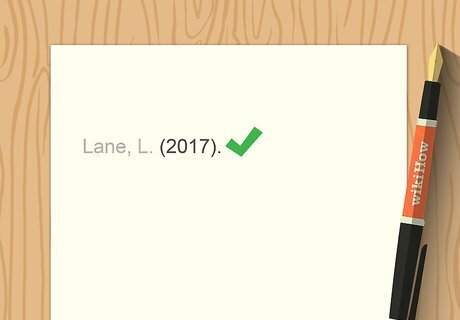
Provide the year of publication in parentheses. After the author's name, include the year the book was published, as listed on the title page or in the copyright information. If the book has several editions, use the year of publication for the book you've read. Place a period after the closing parentheses. Example: Lane, L. (2017).

Type the full title of the book in italics. Following the year of publication, provide the title in sentence-case, capitalizing only the first word and any proper nouns. If the book has a subtitle, place a colon after the title and then type the subtitle. Capitalize the first word and any proper nouns in the subtitle. Place a period at the end. Example: Lane, L. (2017). Serially saved by Superman: My work with Clark Kent.

End your citation with publication information. For a print book, type the location of the publisher followed by a colon. After the colon, type the name of the publishing company that published the book. Place a period at the end of your citation. Example: Lane, L. (2017). Serially saved by Superman: My work with Clark Kent. New York, NY: DC Publishing. For US locations, include the name of the city and the postal abbreviation for the state. For locations in other countries, provide the name of the city and the name of the country.
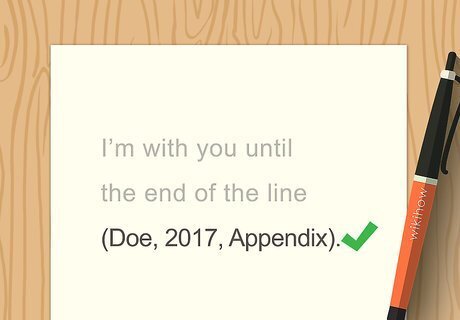
Include the regular author-date citation in text. The in-text parenthetical citation for an appendix to a larger work is not that much different from normal. However, after the year of publication, add the word "Appendix" to point your readers directly to the appendix. Example: (Lane, 2017, Appendix) If there are multiple appendices in the work, use the label provided in the work to point your readers to the correct appendix. For example: (Lane, 2017, Appendix A)
Chicago
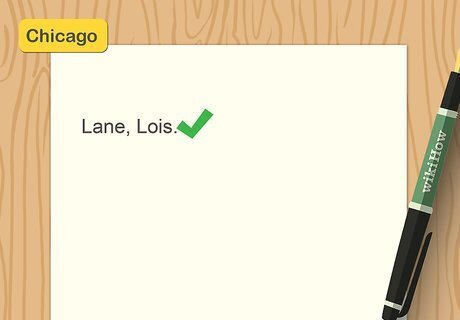
Put the author's last name first, followed by their first. In your references, the full citation always starts with the name of the author. If the appendix was written by a different author than the work as a whole, use the name of the author of the appendix. Example: Lane, Lois.

Identify the part of the work you are citing. The next part of your full citation would normally be the title of the work. However, since you're only citing the appendix, use the phrase "Appendix to" to introduce the title of the book. Type the title in italics using title-case. Example: Lane, Lois. Appendix to Serially Saved by Superman: My Work with Clark Kent If there is a different author for the work as a whole, include their name after the title of the work. For example: Lane, Lois. Appendix to Heroes through the Ages, by Stan Lee
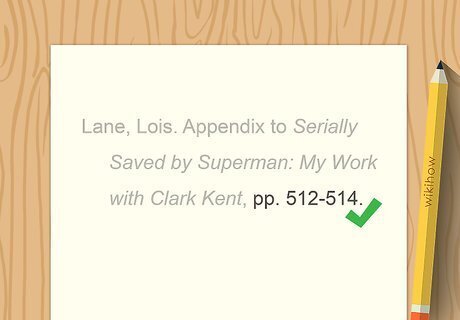
Add page numbers to the end of your citation. Unlike when you're citing the entire work, if you're just citing a piece of a work (such as an appendix), include the page numbers for the appendix in the full citation at the end of the title. Use the abbreviation "pp" for multiple pages, or "p" for a single page. Place a period after the final page number. Single author example: Lane, Lois. Appendix to Serially Saved by Superman: My Work with Clark Kent, pp. 512-514. Different authors example: Lane, Lois. Appendix to Heroes through the Ages, by Stan Lee, pp. 711-713.
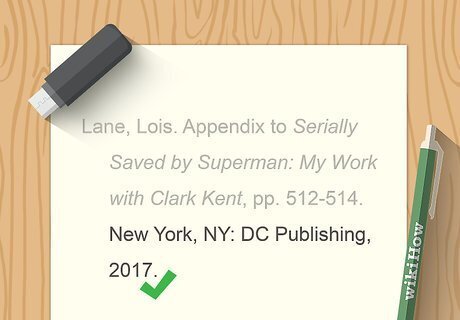
Close your citation with publication information. The location of the publisher, name of the publishing company, and year of publication round out your full citation. Place a colon after the location, then type the full name of the publishing company. Place a comma after the name of the publishing company, then type the year the book was published. Example: Lane, Lois. Appendix to Serially Saved by Superman: My Work with Clark Kent, pp. 512-514. New York, NY: DC Publishing, 2017.
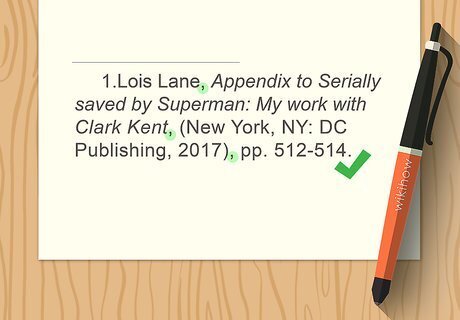
Start with the author's first name in footnotes. A footnote within the body of your paper follows much the same format as your bibliographic citation. However, name the author by their first and last name, and place commas instead of periods between the parts of the citation. Publication information goes in parentheses. Note that the page numbers go at the end of the footnote, rather than immediately after the title. Example: Lois Lane, Appendix to Serially saved by Superman: My work with Clark Kent, (New York, NY: DC Publishing, 2017), pp. 512-514.




















Comments
0 comment